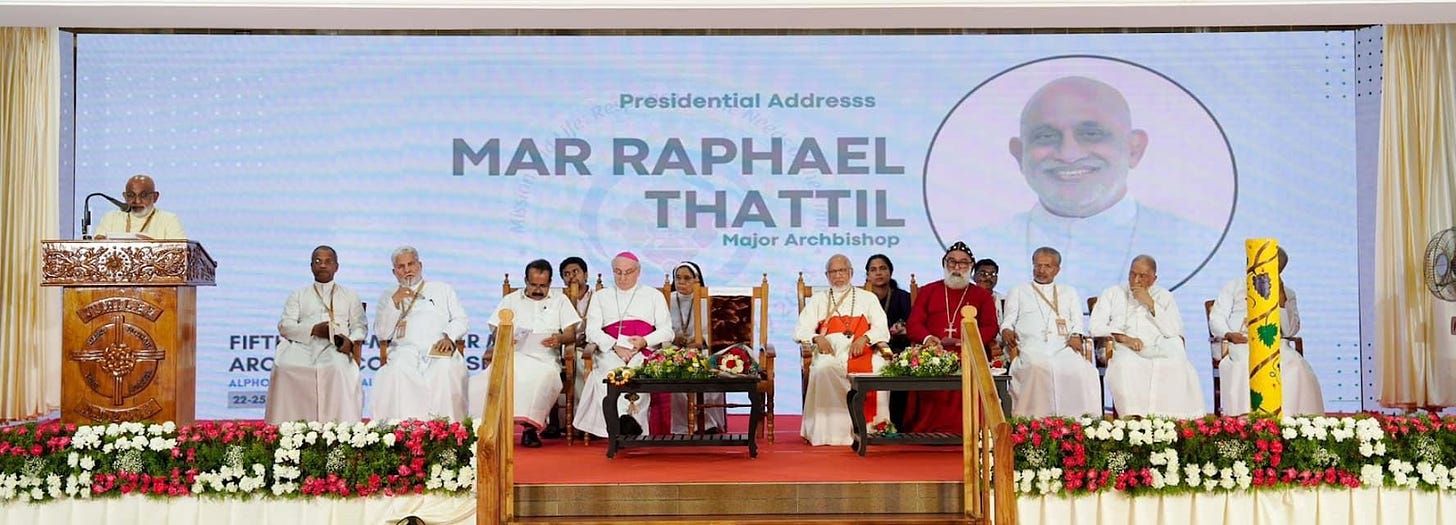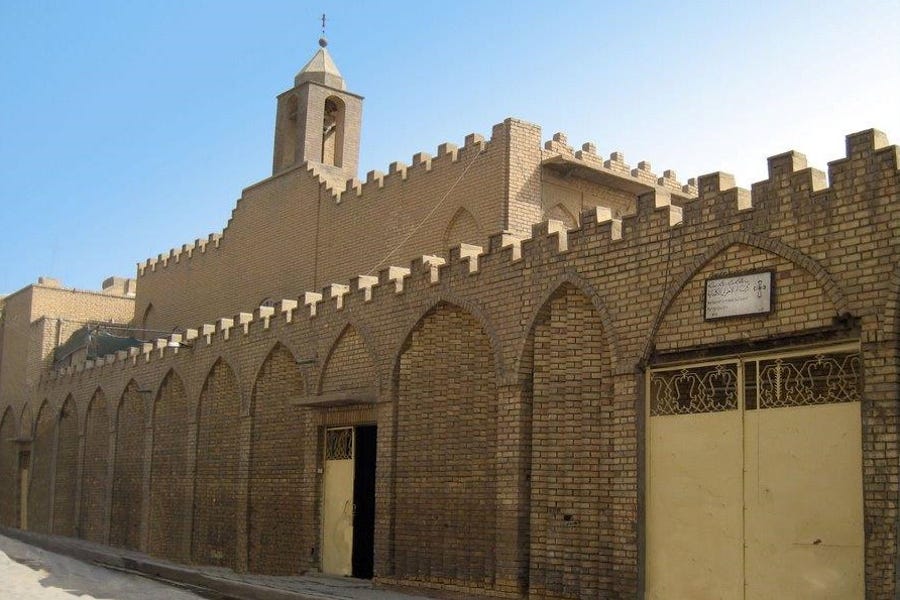The Syro-Malabar Church’s leaders called for liturgical unity on Sunday, at the close of the first archepiscopal assembly in eight years.
The assembly called for more active participation by lay Catholics in both church and secular affairs, as well as liturgical harmony following years of conflict in its largest diocese.

More than 300 lay, clerical and episcopal delegates met for several days in Pala, in the southern Indian state of Kerala, to discuss the themes of renewal of faith formation, lay participation in evangelization, and greater recognition of the Syro-Malabar community in civil society.
The session was opened August 22 by the apostolic nuncio to India, Archbishop Leopoldo Girelli, who spoke about the “significant responsibilities” of lay people in addressing “the challenges of evangelisation,” and “to revitalize and fortify the Church.”
The assembly closed Sunday with the publication of a final document, endorsed by Major Archbishop Raphael Thattil, head Syro-Malabar Church, the second largest of the 23 Eastern Churches sui iuris in communion with the Holy See.
The text called Syro-Malabar Christians to offer a timely reflection of the faith in Indian society, for “community to be strengthened” and for an “ignition of the apostolic spirit.”
The fifth major archiepiscopal assembly concluded with a call to “give more space to the lay faithful in the mission fields,” and for new spiritual emphasis on and structural support for lay apostolates, including the creation of new lay missionary action plans, programmes and the designation of new missionary areas.
The text placed considerable emphasis and priority on the fostering and advancement of the Syro-Malabar community, both in India and internationally, and called for more coordinated and concerted participation by the lay faithful in social and political affairs.
“Demographic problems, agricultural and environmental problems, economic sector setbacks, social and political backwardness, the neglect of historical heritage and culture in Catholic society,” are all common problems facing the community, the assembly said, while calling for “the representation of community members in the political spheres.”
“Members of the community should become active in politics,” the document said. “The Church wants to campaign unitedly for the rights of minority groups, envisioned by the ruling party and for the empowerment of Dalit Christians, members of the Church such as Nadars, Kammals and other disadvantaged classes.”
The assembly also called for the better recognition of Christian history and culture in wider Indian society, including in school curricula, and through the recognition of Dukrana Thirunal, the Syro-Malabar feast of St. Thomas the Apostle, as a public holiday.
For the past decade, India has had a government formed by Prime Minister Narendra Modi’s Hindu nationalist Bharatiya Janata Party (BJP). However, local political campaigns in the southern Indian region of Kerala — which has a larger Christian minority population than any other Indian state — have increasingly sought to court Christian voters.
While Modi has held several meetings with Church leaders in recent years, and was photographed warmly embracing Pope Francis in 2021, since Modi came to power in 2014, representatives of India’s religious minorities have complained of rising intolerance.
At the start of 2024, the advocacy group Open Doors named India as the 11th worst country in the world in which to be a Christian, describing persecution levels as “extreme.”
The United Christian Forum for Human Rights, an Indian ecumenical monitoring group, recorded 161 cases of anti-Christian discrimination and persecution in the first 75 days of this year.
Almost 30% of the incidents occurred in Chhattisgarh, a central state notorious for anti-Christian animus, but threats were recorded in 19 out of India’s 28 states.
On Sunday, the Syro-Malabar assembly warned that “advocating and campaigning for ecclesiastical and communal rights can be interpreted as religious fundamentalism and terrorism” in the current climate.
The ongoing liturgical tensions which have plagued the Syro-Malabar Church’s largest diocese also featured in the final assembly document, with participants affirming that they endorsed the unified mode of the liturgy for the celebration of Holy Qurbana and “demanded strongly” its celebration in every diocese.
The Eastern Church has suffered from a decades-long “liturgy war,” pitting supporters of a new “uniform” mode of the Eastern Church’s Eucharistic liturgy against advocates of a liturgical form introduced after Vatican Council II.
The uniform mode, backed by the Synod of Bishops and the Vatican, blends two ways of celebrating the Syro-Malabar Church’s Eucharistic liturgy: the ancient one in which the priest faces East throughout (ad orientem) and a 20th-century mode in which the priest faces the people throughout (versus populum).
A priest celebrating according to the uniform mode — also known as the “50:50 formula” — faces the people during the Liturgy of the Word, turns toward the altar for the Liturgy of the Eucharist, and faces the people again after Communion.
Although the uniform mode was adopted with only sporadic resistance or controversy in 34 of the Church’s 35 eparchies, in the Archeparchy of Ernakulam-Angamaly, the Syro-Malabar Church’s most populous and prominent diocese, the issue remains fiercely contested.
The majority of the archeparchy’s 655,000 members want their version of the liturgy, in which the priest faces the people throughout, to be recognized as a legitimate variant.
Church leaders, including a special papal delegate, have threatened canonical sanctions — including excommunication — against clergy and faithful who refuse to adopt the approved liturgy, though to date deadlines for conformity have been allowed to pass without penalties being declared.
Earlier this year, Church authorities had set a deadline of July 3 for priests to accept the new liturgy approved or be declared in schism. But in a last-minute compromise, they permitted clergy to continue celebrating the liturgy facing the people throughout as long as they agreed to celebrate one uniform liturgy on Sundays in their parishes.
Following the major archiepiscopal assembly’s declaration on Sunday, a lay group opposed to the liturgical reforms issued a statement calling it “a deliberate attempt… to undermine the consensus and peace that exists within the Ernakulam archdiocese.”
According to the group, called Almaya Munnettom, nearly 70 delegates spoke during the assembly but, they claimed, only three mentioned the uniform mode of the liturgy in their remarks. The group also claimed that no delegates from the Archeparchy of Ernakulam-Angamaly spoke during the forum.
“The assembly allowed not only those who had signed up to speak, but anyone who raised their hand to share their views. Yet, they chose to remain silent,” he said.
During the assembly sessions, a small number of protesters from the archeparchy distributed leaflets criticizing the former leadership of the archeparchy, specifically Cardinal Geroge Alencherry and the former apostolic administrator of the archeparchy, Archbishop Andrews Thazhath, both of whom were present at the assembly.
The Syro-Malabar Church is now led by Major Archbishop Major Archbishop Raphael Thattil, who succeeded Cardinal Alencherry in January, after being elected by the 53 voting members of the Syro-Malabar Church’s synod of bishops, and approved by Pope Francis.
He previously led the Eparchy of Shamshabad since its creation in 2017 and prior to becoming major archbishop had largely remained apart from the sometimes violent liturgical disagreements in Ernakulam-Angamaly, which have seen hunger strikes, demonstrations in which cardinals were burned in effigy, and scuffles in the sanctuary of the archeparchy’s cathedral, which remained closed for more than a year following police intervention.
However, since his election, he has come under sometimes fierce criticism in the conflict, including from other bishops.
In June, Thattil sent a letter threating to excommunicate Indian Catholics who fail to accept the new liturgy by July 3. In response, several Syro-Malabar bishops wrote to Thattil, criticizing his action as reminiscent of the Middle Ages.
The five bishops, who have strong ties to the Ernakulam-Angamaly archeparchy, suggested that the ultimatum undermined the Synod of Bishops.
Later that month, after further discussions at among the Church’s synod, a compromise was announced allowing Ernakulam-Angamaly’s clergy to continue celebrating their preferred form of the Eucharistic liturgy, but would also have to celebrate one uniform liturgy in their parishes every Sunday.
However, despite apparent reluctance within the Church’s own governing synod to allow the liturgical standoff to tip into a full blown crisis of communion, Rome has backed the Church’s leadership in threatening canonical sanctions.
In an interview earlier this month, Archbishop Cyril Vasil’, who was appointed papal delegate to the Syro-Malabar Church in July 2023, said that “work is currently underway to establish a special tribunal” for those who threaten Church unity “by inciting disobedience to legitimate authorities and their decrees.”
“For the time being, no action is being taken against priests who have at least partially begun to implement the synodal way of celebrating the liturgy by celebrating according to the new regulations, at least on Sundays and feast days,” Vasil’ said in the interview, posted Aug. 1 on the Slovak bishops’ conference website.
“This does not, of course, mean legitimizing a different celebration on the other days, but only a certain temporary restraint in the application of the necessary penal procedures against priests.”
The archbishop said that the majority of priests in the Archeparchy of Ernakulam-Angamaly — had made the change on Sundays, but that “other priests who stubbornly continue to refuse to celebrate the liturgies according to the norms established by the Synod of Bishops are, by their actions, practically placing themselves in schism with the authority of their own Church and must reckon with legal sanctions.”




